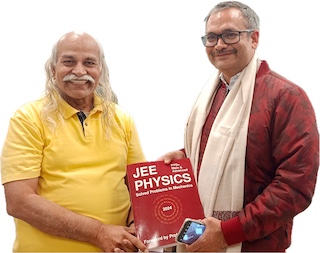The Torque τ on a Body about a Given Point is : Important Problem
Problem: The torque $\vec{\tau}$ on a body about a given point is found to be equal to $\vec{A}\times\vec{L}$, where $\vec{A}$ is a constant vector and $\vec{L}$ is the angular momentum of the body about that point. From this its follows that (IIT JEE 1988)
- $\text{d}\vec{L}/\text{d}t$ is perpendicular to $\vec{L}$ at all instants of time.
- the component of $\vec{L}$ in the direction of $\vec{A}$ does not change with time.
- the magnitude of $\vec{L}$ does not change with time.
- $\vec{L}$ does not change with time.
Answer: The options (A), (B) and (C) are correct.
Solution: The torque is equal to the rate of change of angular momentum, \begin{align} \frac{\mathrm{d}\vec{L}}{\mathrm{d}t}=\vec{\tau}=\vec{A}\times\vec{L}. \end{align} The cross product $\vec{A}\times\vec{L}$ is perpendicular to both $\vec{A}$ and $\vec{L}$ and hence ${\mathrm{d}\vec{L}}/{\mathrm{d}t}$ is perpendicular to $\vec{L}$.
Let $\vec{L}=L_x\hat\imath+L_y\hat\jmath+L_z\hat{k}$ and $\vec{A}=A\,\hat\imath$ ($\vec{A}$ being a constant vector allows us to define $x$ axis along $\vec{A}$). Substitute in above equation to get, \begin{align} \frac{\mathrm{d}L_x}{\mathrm{d}t}\;\hat\imath+\frac{\mathrm{d}L_y}{\mathrm{d}t}\;\hat\jmath+\frac{\mathrm{d}L_z}{\mathrm{d}t}\;\hat{k} & =\vec{A}\times\vec{L}\\ &=-AL_z\hat\jmath+AL_y\hat{k}, \end{align} which gives, \begin{align} \frac{\mathrm{d}L_x}{\mathrm{d}t}&=0,\\ \frac{\mathrm{d}L_y}{\mathrm{d}t}&=-AL_z,\\ \frac{\mathrm{d}L_z}{\mathrm{d}t}&=AL_y. \end{align} First equation gives $L_x=\text{constant}$. Differentiate $\vec{L}\cdot\vec{L}=L^2$ and use above equations to get, \begin{align} \label{job:eqn:6} \frac{\mathrm{d}L^2}{\mathrm{d}t}&=\frac{\mathrm{d}}{\mathrm{d}t}\left(L_x^2+L_y^2+L_z^2\right) \\ &=2L_x\frac{\mathrm{d}{L_x}}{\mathrm{d}t}+2L_y\frac{\mathrm{d}{L_y}}{\mathrm{d}t}+2L_z\frac{\mathrm{d}{L_z}}{\mathrm{d}t}\nonumber\\ &=2L_x (0)+2L_y(-AL_z)+2L_z(AL_y)\\ &=0. \end{align} From above equation $\frac{\mathrm{d}L^2}{\mathrm{d}t}=2L\frac{\mathrm{d}L}{\mathrm{d}t}=0$, which gives $L=\text{constant}$.
